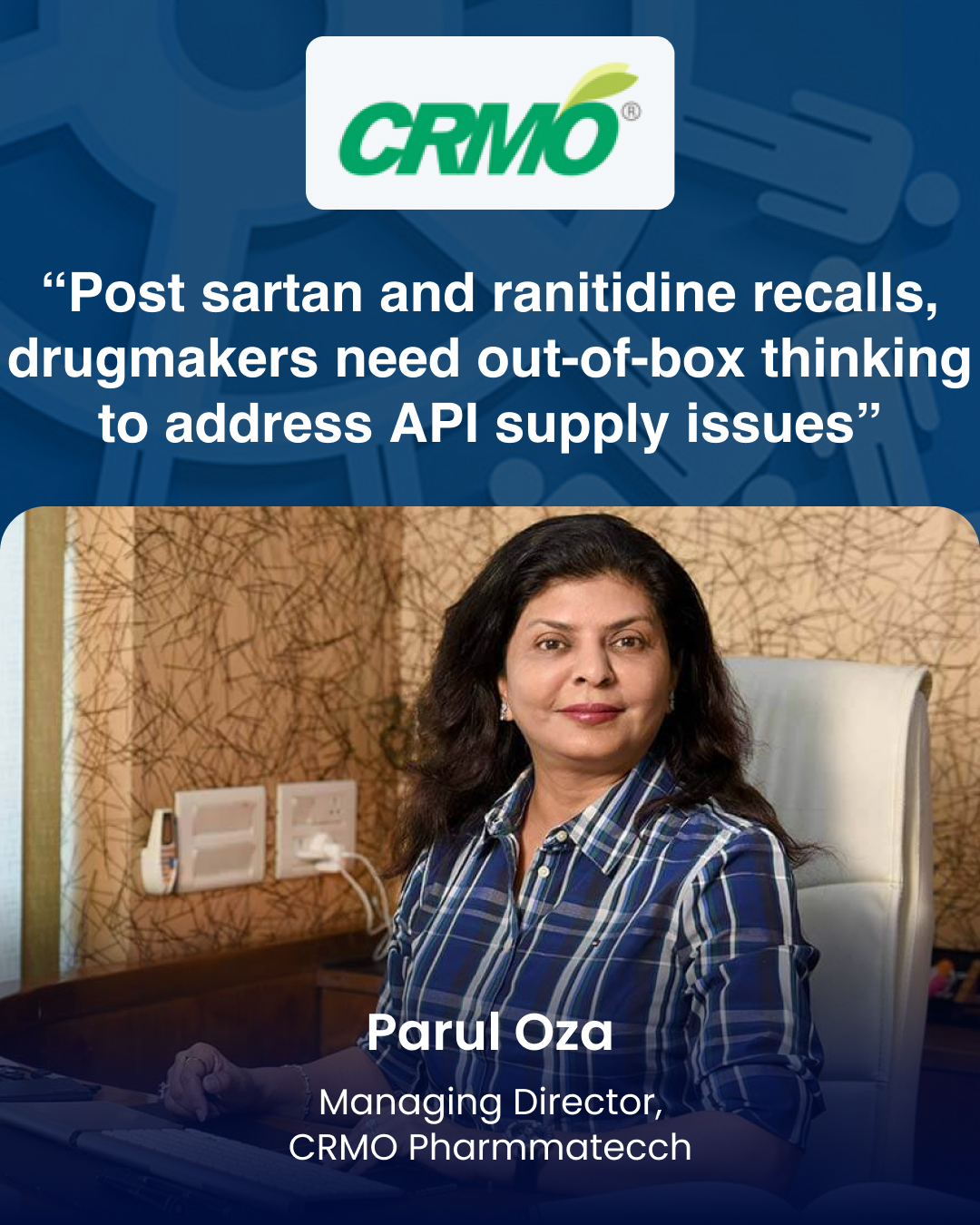
#SpeakPharma with CRMO Pharmmatecch
2019-12-10
Impressions: 5418
Last year, we had interviewed Parul Oza to understand the challenges being faced by the API (active pharmaceutical ingredient) industry. Oza is the Managing Director of CRMO Pharmmatecch, an Indian company (headquartered in Ahmedabad) that provides complete outsourcing solutions to the pharmaceutical industry. This week, Oza is back on SpeakPharma. She tells us how the API and intermediate manufacturing industry is undergoing a complete revamp after the sartan and ranitidine recalls.
Thanks for speaking to SpeakPharma. Tell us how the API and chemical manufacturing industry has evolved over the last few decades. And the impact the recent sartan and ranitidine recalls have had on the industry.
The industry has come a long way since the late 1980s. Back in those days, finding manufacturers who could supply the desired product and meet the quality specifications was a big challenge.
In the late 1990s and early 2000s, as API and chemical manufacturing developed in India and China, supply concerns eased significantly and price became the primary driver of decision making. However, things began to change drastically once the Ranbaxy story exploded and the current good manufacturing practices (cGMP) compliance concerns started taking centerstage.
The recent developments have created an even more drastic shift. Today, it requires out-of-the box thinking to address the issue of long-term sustainable supply of APIs. This, in turn, involves keeping one’s ear to the ground and having deep technical insights that are supported by data analytics.
In order to obtain long-term sustainable supplies at
competitive prices, there is often a need to develop a new supplier rather than
work with existing suppliers who have an established history of problems.
Our sartan price trends dashboard provides insights into how the prices of commonly used APIs such as valsartan, olmesartan and losartan and those of their key starting materials (KSMs) have changed.
What’s different now on the quality approach?
The sartan and ranitidine recalls have placed chemical manufacturing operations under a completely new level of scrutiny, unlike anything that had been experienced by the industry. Regulatory agencies, such as the European Medicines Agency (EMA) and SwissMedic, now mandate that all products manufactured through chemical synthesis undergo risk evaluation for genotoxic impurities.
While the manufacturing process is one element which introduces the risk of mutagenic impurities, there are external factors that significantly increase cross-contamination risk as well.
In a recent warning letter issued by the US Food and Drug Administration (FDA) to Mylan, an investigation determined that nitrosamine contamination was recovered from solvents. And the contamination was 40 times the limit set by Mylan.
The warning letter also highlighted that the problems were not contained within Mylan’s operation as Mylan was supplied solvents (that were contaminated with nitrosamines) from multiple contract
manufacturers.
Even after Mylan suspended the use of recovered solvents from contract manufacturers and began relying on in-house solvent recovery, the solvents were still found to contain nitrosamine impurities.
In August, Lantech Pharmaceuticals Limited, a firm that undertakes contract solvent recovery facility for valsartan API manufacturing operations, was issued a warning letter by the FDA after being placed on an import alert in June. Samples collected from Lantech’s equipment were found to contain mutagenic impurities.
As companies often fail to identify the root cause of genotoxic and other impurities in their APIs, the implementation of audit trail controls leads to the identification of more problems. As a result, inadequate handling of manufacturing deviations and out of specification (OOS) results is almost a constant in all warning letters which are being issued to companies around the world.
Today, FDA inspectors are evaluating analytical methods and cleaning procedures followed at sites in a lot more detail than ever before.
What kind of changes are you witnessing on the supply side?
Environmental concerns have led to a significant reduction in factories available to produce KSMs and APIs. Factories in China are closing down due to government controls and environmental norms. In India, there is a slowdown in permissions being granted to companies to expand their manufacturing capacities. The net result is that it is becoming extremely difficult to find manufacturers who are willing to take on projects.
In addition, the costs in India and China are increasing. Therefore, finding reliable manufacturers who can sustain long-term supplies at competitive prices has become critical.
Supply chain professionals who were earlier spoilt for choice with multiple supply options now need ‘out of the box’ thinking to ensure long-term sustainability of supplies.
We
are also observing changes in KSM manufacturing, which used to be done in India
before it moved to China. We find that KSM manufacturing is returning to India
as the government controls in China continue to tighten.
What role can CRMO Pharmmatecch play in the given scenario? How do you help manufacturers?
We have over 30 years of industry experience, and have developed project outsourcing expertise.
We undertake detailed market assessment reports. These, coupled with our years of experience, help us identify suitable outsourcing partners.
In addition, we facilitate cGMP compliance inspections to evaluate the capability of companies to meet the expectations of regulators. Our technical capabilities allow us to look at the manufacturing process in detail to ensure traceability, process robustness and cross contamination risk potential.





